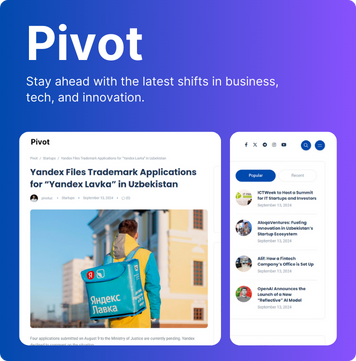
Students from Almaty have launched a startup called it.taboo—an online platform to support homeless animals. The platform aims to connect shelters with those who want to adopt pets. Digital Business spoke with the project’s team leader, Aiyym Mynbay, to learn why this initiative is so essential for Kazakhstan, how the service will help find homes for four-legged friends, and whether such a digital solution can become a profitable venture.
“Kazakhs May Simply Not Know Where Shelters Are or How to Help Them”
“It all started with a competition. We were studying at a business school where we had to create a social project in three weeks. During brainstorming sessions with other participants, we discussed various ideas and remembered the issue of homeless animals in Kazakhstan. In 2022, a law prohibiting the culling of stray dogs was passed in the country. However, significant sums (3.5 billion tenge in 2023 alone) are spent on catching and tagging stray animals, yet the number of animals on the streets hasn’t decreased.
State shelters are overcrowded, and private shelters rely on limited donations. We decided we could help private shelters with financial and informational support.
We thought Kazakhs might simply not know where shelters are or what they need. A centralized portal with information about all shelters and a quick QR code donation feature could help. For those who want to adopt a dog or cat, we envisioned something like a catalog with photos and the animals’ stories.
We suspected that animal shelters might lack the time and resources to create such a service themselves. To confirm this, we surveyed several organizations. Most of them reported difficulties in launching and maintaining such a solution. We also conducted a survey among 85 schoolchildren and found that 78.8% of respondents would find an online platform for helping animals convenient.
We named the project it.taboo, combining Kazakh and English words. The name carries multiple meanings. In English, ‘it’ refers to ‘information technology’ while in Kazakh, it means ‘dog.’ The word ‘taboo’ is derived from the Kazakh verb ‘tabu,’ meaning ‘to find.’ Together, it can be understood as ‘finding a dog through technology.’
We divided roles equally—there is no formal leader. I handle project coordination and ensure we regularly meet to discuss tasks. We are from different schools. I study at Gymnasium No. 105 named after Uraz Dzhandosov. Arman Rakhimzhanov, an 11th-grade student at Lyceum No. 95, handles web development, platform design, and social media posts. Aruzhan Zhaksylyk from Joo High School is a project manager working with volunteers and managing SMM. Kirill Tsoi from Gymnasium No. 34 is the administrator.
The website will essentially be a complex web application with various access levels and a data management system. The primary task is to consolidate information from different shelters into one database via API. Currently, there is a prototype of the service, and we plan to launch it in the coming months.

“We Want Pets to Find People, Not the Other Way Around”
The service will have several features tailored to different audiences:
- Raising support for shelters. Currently, this is done through collection boxes placed around the city where people can donate pet food and other necessities. We collaborate with several Almaty shelters such as Amigo, Dvoryanskoe Sobranie, Kotopes, and Neigrushki. In the future, each shelter will have a dedicated QR code for payments and bank details listed on the site. Once funds are received through the platform, we plan to publish financial reports accessible to all users.
- Rehoming homeless animals. The site will feature a catalog with photos and stories of pets. If someone is interested, they can leave a request and later visit the shelter to meet their potential new companion. We will also highlight pets on social media. Our goal is to shift the narrative from “people find shelters” to “pets find people.”
- Volunteer network development. We aim to make it.taboo a hub for those who want to volunteer at shelters or make regular donations.
- Feeding street animals. In October, we organized an event called “Feeding Homeless Animals” on Saryarka Street. Though attendance was small, it was a promising start. All the animals received the attention and food they needed. Such events also demonstrate our seriousness to shelters and potential sponsors.
“Our Goal Is to Reduce the Number of Homeless Animals in a Year”
Initially, it.taboo was created for a competition. The prize was a full scholarship to KIMEP University. Although we didn’t win, finishing in third place, the project caught the attention of Partners Pay founder Azamat Zharylkasyn, who is now mentoring our team.
For us, completing the project was essential, especially since some of the judges could potentially become sponsors. We’re actively pitching the project to investors to secure funding, primarily to hire a programmer. Essential features like announcements, filtering systems, and volunteer/donor chat functions require professional implementation.
We sent emails to 50 companies, but most did not respond. We later received advice to focus on face-to-face communication, as written requests often go unnoticed. This experience taught us how crucial networking is for startups.
We don’t plan to rely solely on donations. The project envisions multiple revenue streams. Initially, we’ll monetize the platform through advertisements related to pet care, featured on the site and in social media. Donations from users will also contribute to the revenue, as well as paid features like promoting announcements to the top of the list.
Of course, it.taboo won’t generate massive profits, and we aren’t expecting quick results. Meaningful change takes time. Our goal is to reduce the number of homeless animals in a year. We hope every four-legged friend finds the home, care, and respect they deserve.




Leave a Reply